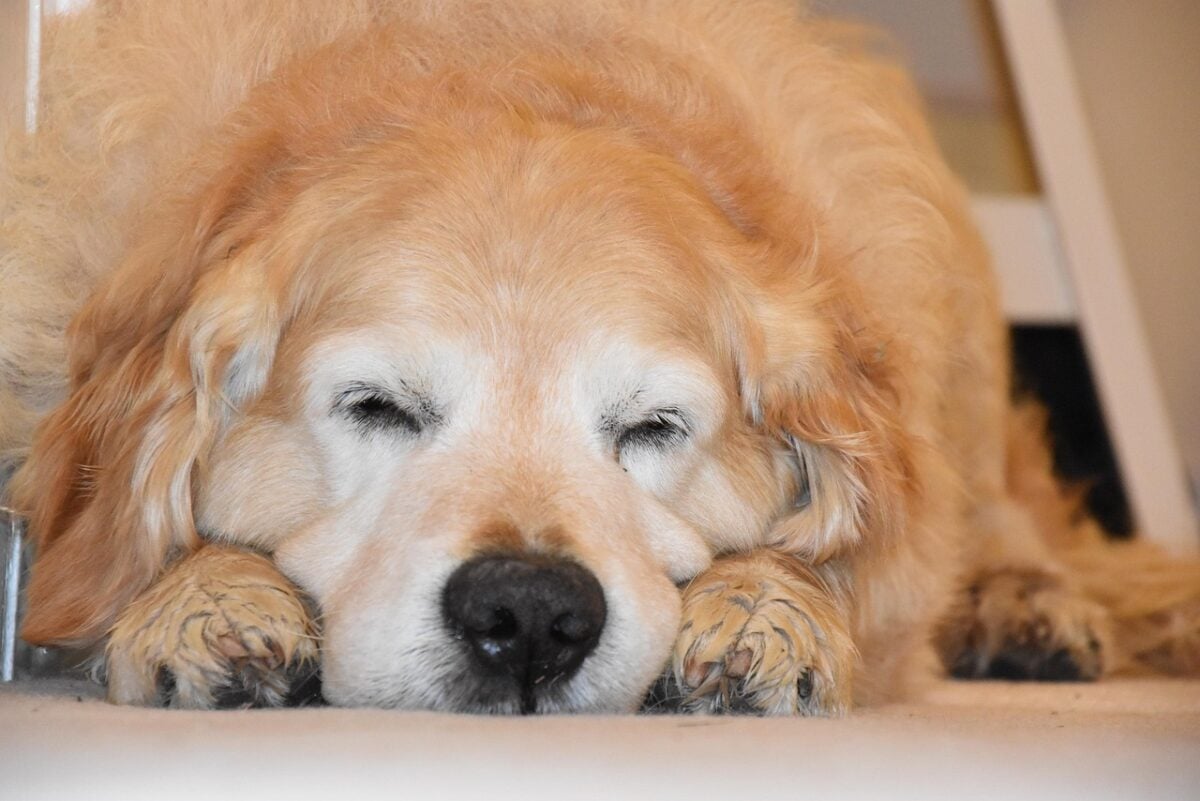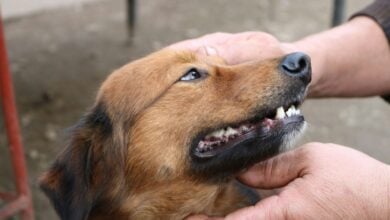Why Your Dog Snores Sound Like Darth Vader (And When You Should Worry)
When you purchase through links on our site, we may earn a commission. Here’s how it works.
You’re half asleep when it starts: the heavy, rhythmic breathing of Darth Vader echoing from the dog bed.
Table of Contents
Except it’s not a galaxy far, far away. It’s your Frenchie.
Dog snores can be cute, annoying, or downright alarming, depending on what’s behind them. Here’s how to tell if your canine Sith Lord just needs a new sleep position — or a trip to the vet.
The Force Awakens: Why Dogs Snore (And When You Should Worry)
That deep, rumbling sound might make you laugh, but your dog’s snoring is more than just a quirky bedtime soundtrack.
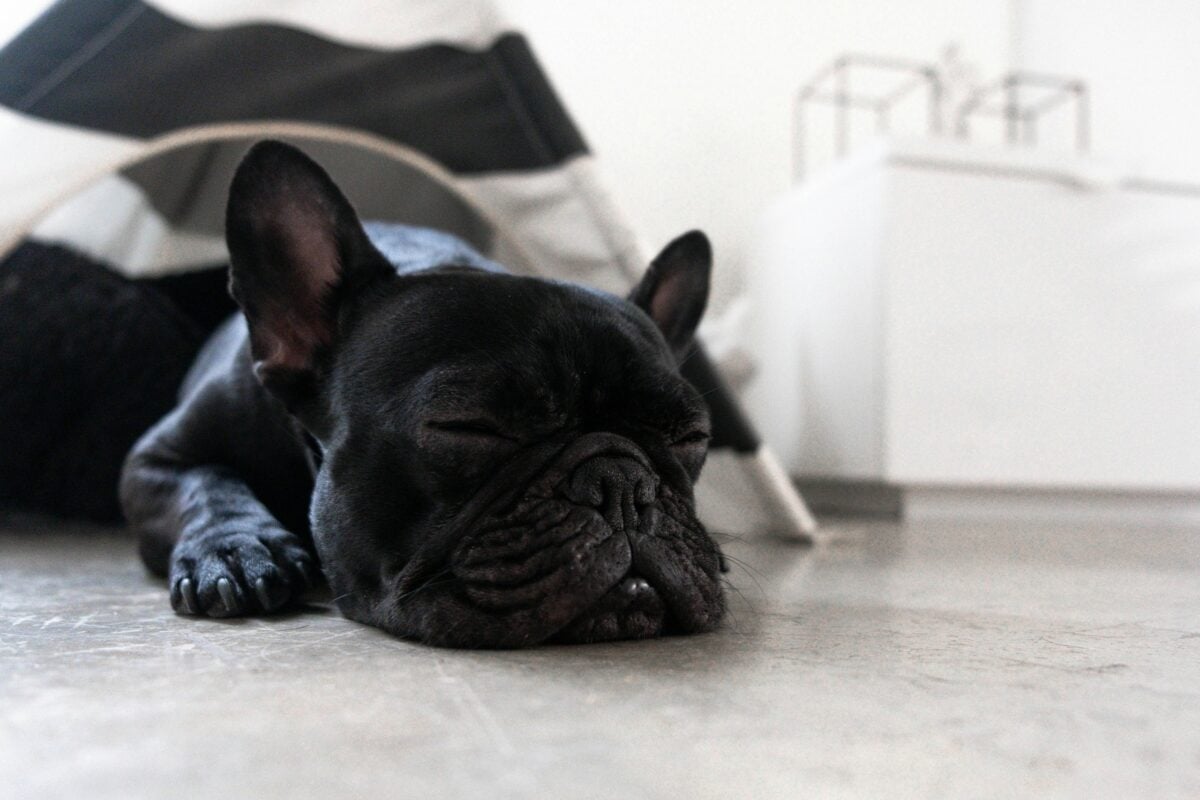
Most of the time, it happens because air is not flowing smoothly through the nose or throat. When those passages get even slightly blocked by anatomy, allergies, or too many midnight snacks, the airflow vibrates and creates that unmistakable Darth Vader effect.
So, is it normal? Sometimes, yes.
Some dogs are just built to be loud sleepers, especially short-nosed breeds like Pugs, Bulldogs, and Frenchies.
But if your dog suddenly starts snoring, gets louder over time, or seems tired and wheezy during the day, it is time to check in with your vet.
Up next, we will look at how to tell normal bedtime noise from a potential airway issue and why your vet can often hear the difference right away.
Is Dog Snoring A Red Flag?
Dog snoring might seem like a harmless quirk, but veterinarians see it as a sign that something is interrupting normal airflow. It could be as simple as sleeping position or the first clue of an underlying problem.

Dr. Rebecca MacMillan, MRCVS, explains, “Dogs don’t snore unless there is a problem with their airways restricting the air from flowing smoothly through their nose and down into their lungs. As such, most dogs are quiet breathers when relaxed.”
Some flat-faced breeds, such as Bulldogs, Pugs, and Pekingese, snore because their facial structure physically limits airflow. Even then, experts emphasize that this should not be considered truly “normal.” These dogs live with chronic airway restriction, and owners should monitor them closely for worsening snoring, heavy breathing, or exercise intolerance.
What Might Be Harmless
Occasional snoring can happen if your dog is sleeping on their back, especially after a long day or a big meal. A stuffy nose from mild allergies or a bit of congestion can also cause brief nighttime noises.
If the snoring goes away once your dog changes position or clears up after a few days, it usually is not cause for concern.
When It’s Cause For Concern
If your dog snores every night, snores loudly, or has started snoring regularly when they never did before, it is time for a vet visit. Flat-faced breeds, such as Bulldogs, Pugs, and Pekingese, are also at higher risk for airway problems and should never be assumed to snore “normally.”
Dr. MacMillan adds, “Signs such as nasal discharge, daytime snoring, lethargy, or loss of appetite all point to a more serious issue.”
Any snore means your dog is working harder to breathe than they should be. The question is why, and that is exactly what we will uncover next.
10 Causes Of Dog Snoring
Snoring always comes down to one thing: air struggling to move freely through the nose or throat. The reasons behind that resistance, however, can vary from harmless to severe.
Understanding the most common reasons dogs snore can help you tell when it is harmless and when it deserves a closer look.
1. Sleeping Position & Anatomy
The way your dog sleeps can make a big difference in how they sound at night. Dogs who sprawl on their backs or curl their necks at odd angles are more likely to snore because their tongue or soft palate partially blocks airflow.
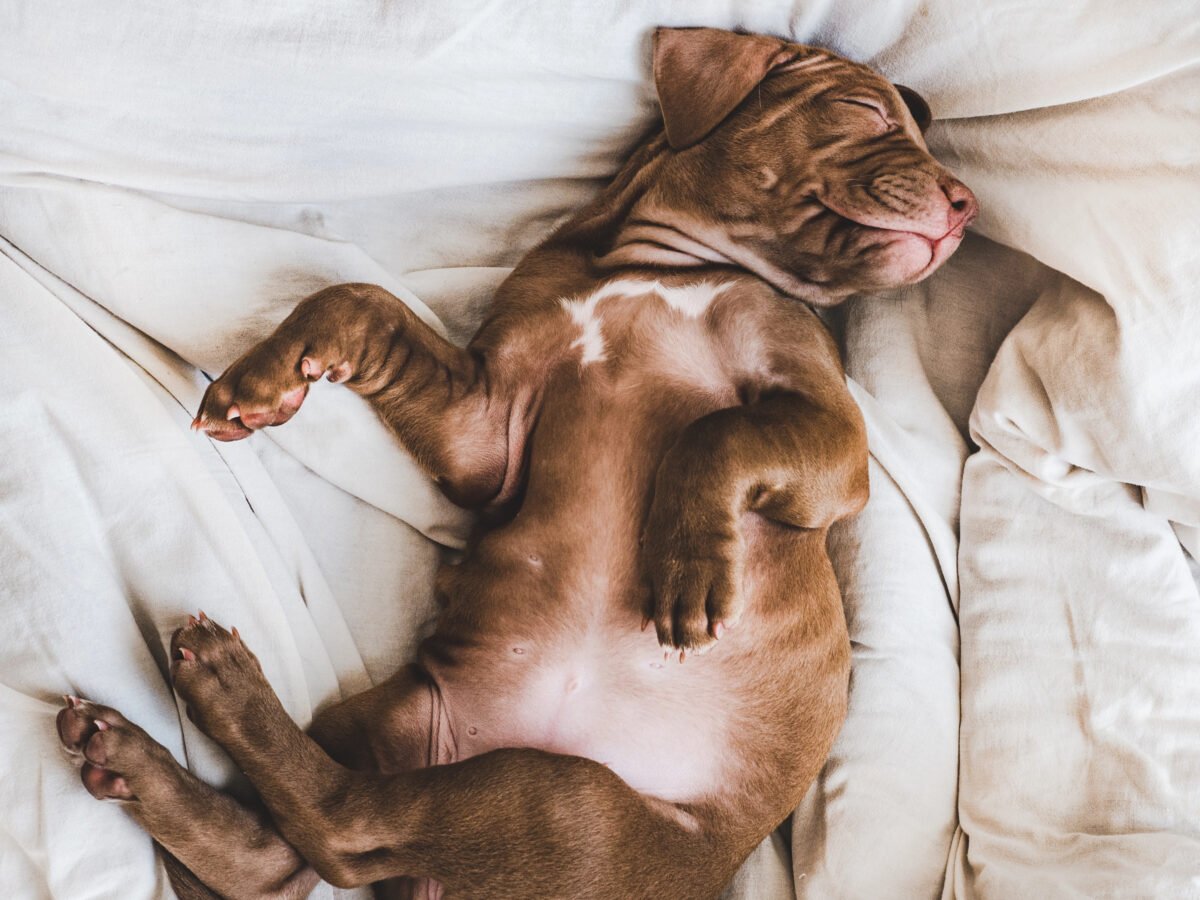
Certain breeds are also more prone to snoring due to their anatomy. Flat-faced dogs like Pekingese and Shih Tzus have shorter airways and smaller nasal passages, which make it harder for air to move freely.
Dr. Rebecca MacMillan, MRCVS, explains that these breeds often live with chronic airway restriction and may snore even when they are otherwise healthy.
2. Allergies & Irritants
Dust, pollen, cleaning sprays, and even scented candles can irritate a dog’s airway. Allergic inflammation can cause tissues inside the nose and throat to swell, narrowing the passageway and producing that familiar rumble.
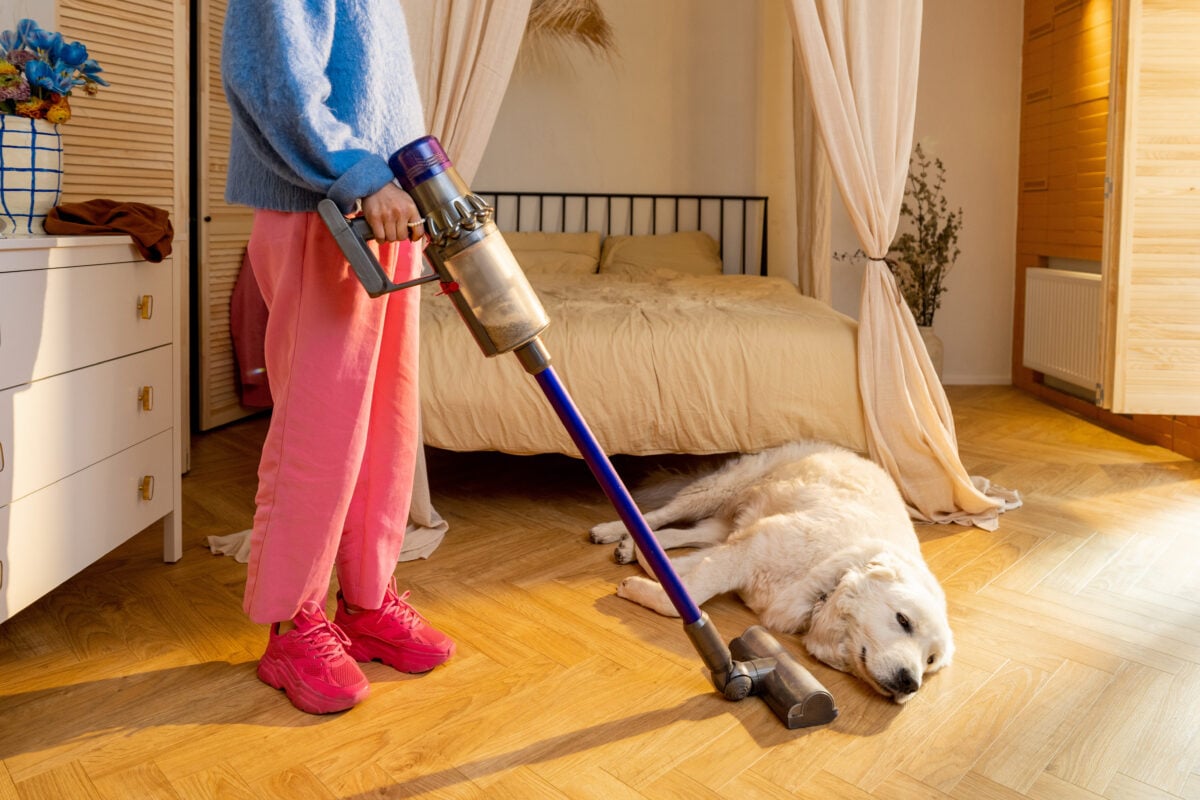
If your dog’s snoring worsens during certain seasons or after housecleaning, an environmental trigger may be to blame.
3. Congestion & Colds
A stuffy nose can turn even the quietest sleeper into a snorer. When dogs develop mild respiratory infections or congestion from allergies, mucus builds up and restricts airflow.
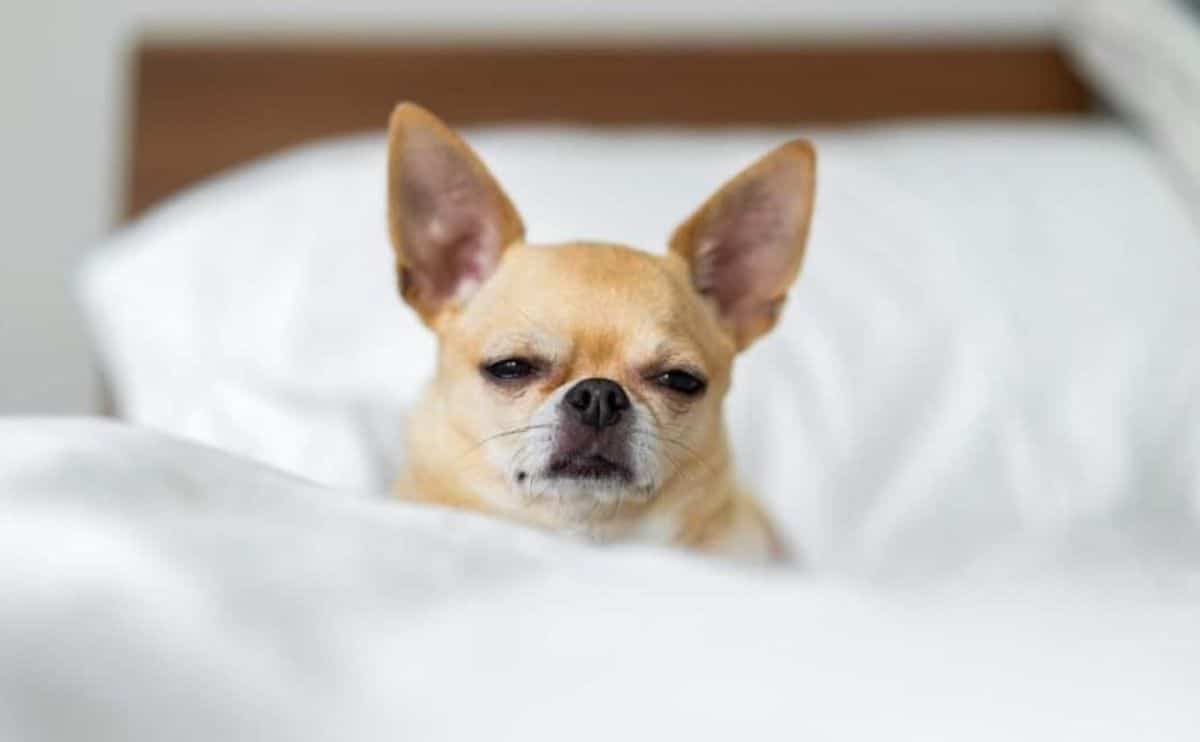
These cases are usually short-lived, but if your dog also seems tired, feverish, or has nasal discharge, it could signal a more serious respiratory infection that needs veterinary care.
4. Obesity
Extra body weight can lead to fatty tissue around the neck and chest, which can press on the airway. Overweight dogs often snore more, pant heavily at night, and tire easily during walks.

Helping your dog reach a healthy weight can make a noticeable difference in both snoring and overall energy levels.
5. Hypothyroidism
Snoring can sometimes be one of the first signs of an underactive thyroid. Hypothyroidism occurs when the thyroid gland doesn’t produce enough hormones to regulate metabolism, which can lead to weight gain, sluggishness, and changes in skin and coat health. The condition can also cause swelling or thickening of tissues in the throat, making airflow noisier during sleep.
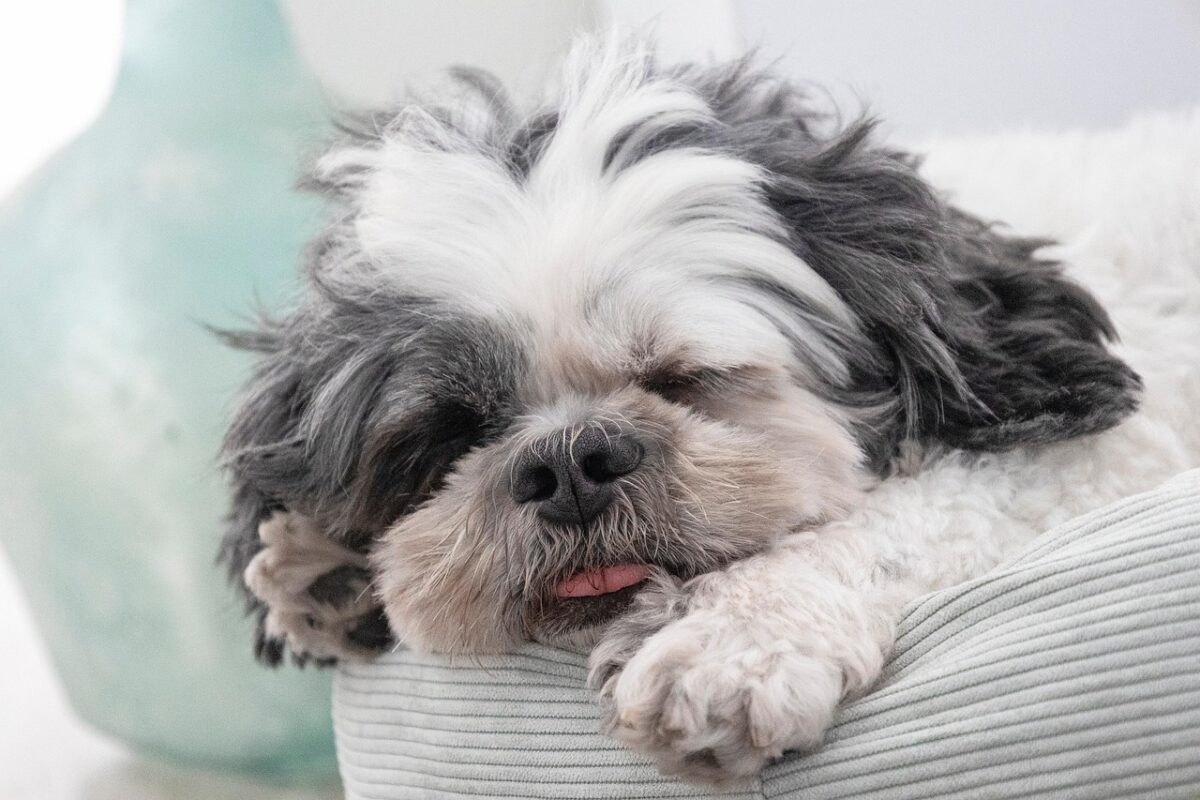
Dogs with hypothyroidism often seem more tired, less active, or may develop a lower-pitched bark over time. A simple blood test can confirm the diagnosis, and with daily medication, most dogs recover energy — and quieter sleep — within weeks.
6. Sleep Apnea
Although uncommon, dogs can develop a sleep disorder called sleep apnea, which causes brief pauses in breathing during sleep. These interruptions reduce oxygen intake and prevent your dog from getting the deep, restorative sleep it needs.

The most common signs include loud, rhythmic snoring interrupted by moments of silence, gasping, or jerking awake. Flat-faced breeds and overweight dogs are at the highest risk because their airways are already narrower than usual.
Over time, untreated sleep apnea can lead to fatigue, irritability, and even heart strain. If your dog shows these signs, your veterinarian may recommend diagnostic imaging or overnight monitoring to confirm the condition and rule out other airway disorders.
7. Dental Problems
Infections or abscesses in the upper teeth can push against the sinuses, which sit just above the roots. This pressure can create inflammation that makes breathing noisier.

Dental issues are easy to overlook, but they are a surprisingly common cause of chronic snoring. Regular cleanings and dental exams help prevent these silent troublemakers.
8. Foreign Objects
Because dogs explore the world nose-first, it is not unusual for something small — like a grass seed, piece of food, or tiny pebble — to get stuck in a nasal passage. This can cause sudden, loud snoring, sneezing, or pawing at the face.

If your dog’s snoring starts out of nowhere, especially after time outside, a nasal obstruction should be ruled out immediately by a veterinarian.
9. Smoke
Even small amounts of smoke can irritate a dog’s respiratory system. Over time, chronic exposure can lead to inflammation and ongoing snoring.
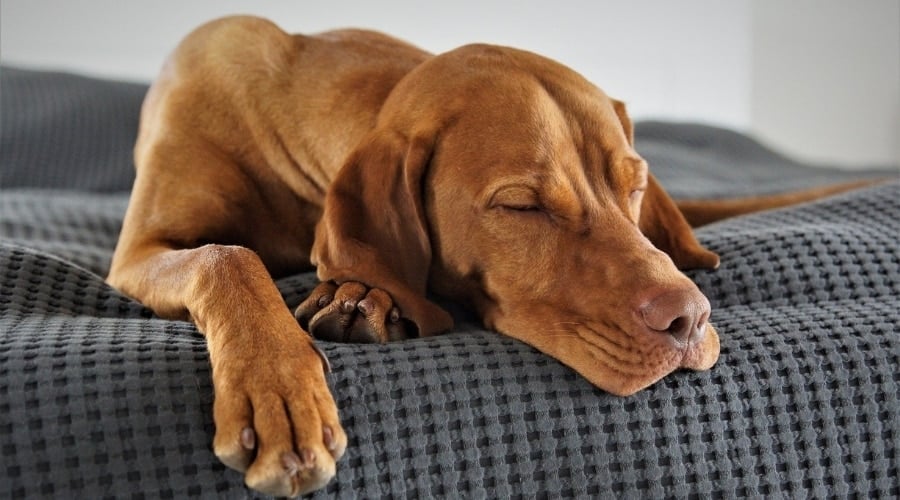
Quitting or avoiding smoking indoors will not only help your dog breathe easier but also protect their long-term lung health.
10. Tumors Or Growths
In rare cases, a growth inside the nasal passage or throat can narrow or block airflow. This type of obstruction often causes one-sided nasal discharge, frequent sneezing, or a snore that never goes away.
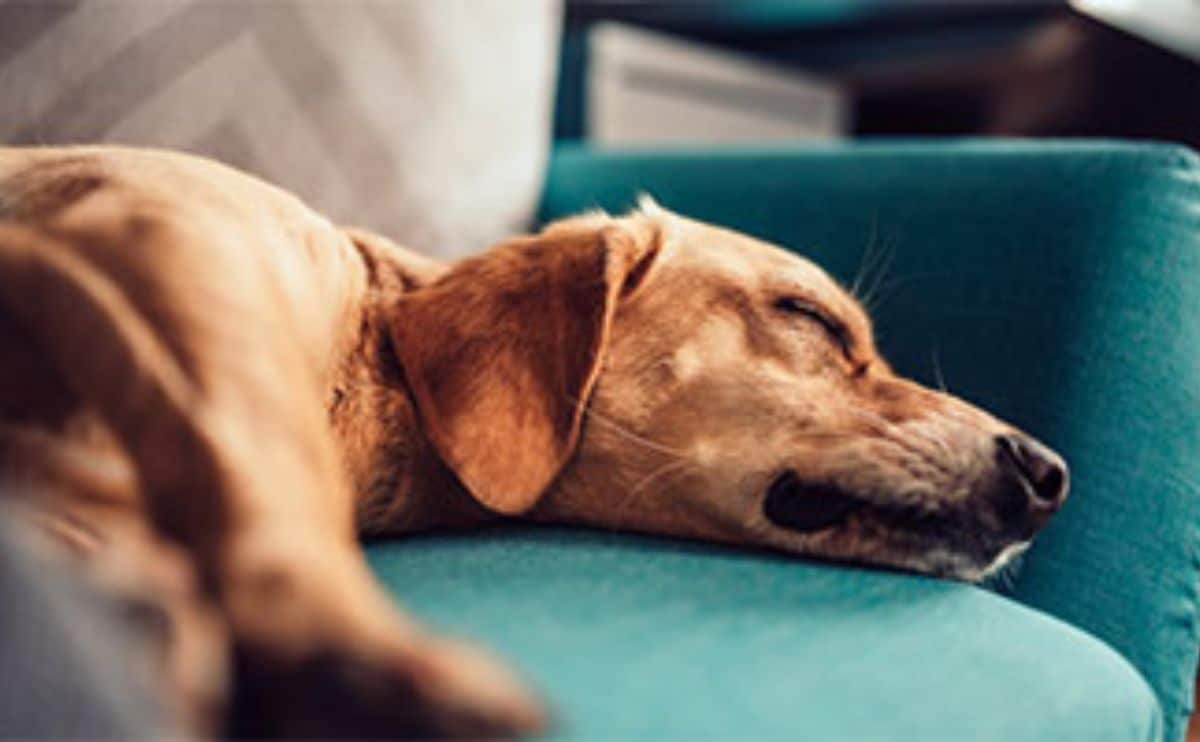
If your dog’s breathing sounds consistently uneven or strained, your veterinarian may recommend imaging to check for a mass.
Quick Takeaway: Every snore has a source. Once your vet identifies the cause, many dogs can breathe — and sleep — much more comfortably.
Puppy Snores vs Senior Snores
Dog snoring can look adorable at any age, but the reasons behind it often depend on how old your pup is. Puppies and senior dogs both tend to snore more than healthy adult dogs, though for very different reasons.
Puppy Snores
Puppies spend much of their day in deep sleep, and their developing airways can vibrate more easily when relaxed. Short, occasional snores are usually nothing to worry about, especially if your puppy is otherwise active and healthy.

Sometimes, puppy snoring points to early anatomical issues, especially in flat-faced breeds like French Bulldogs or Pugs. Because their skulls are still growing, any inherited airway narrowing can become more noticeable as they age.
If your young pup snores loudly, wheezes, or seems to struggle when awake, it’s best to check with your veterinarian early.
Senior Snores
Older dogs often snore because the muscles around their throat and airway lose tone over time, allowing tissues to relax and vibrate during sleep. Snoring can also develop if your senior dog gains weight, has dental problems, or develops nasal passage inflammation.
However, new or worsening snoring in an older dog is not just “a part of aging.” It can signal health changes such as hypothyroidism, respiratory infection, or growths in the nasal cavity. Always mention new snoring habits during your dog’s wellness visits, especially if fatigue or changes in appetite accompany them.
What The Veterinarian Says
Veterinarian Dr. Rebecca MacMillan, MRCVS, says that when a dog starts snoring, her first goal is to find out where the noise is coming from and how much the airway is being restricted.
In practice, veterinarians start by identifying where that restriction occurs. They may look for nasal discharge, swelling, or dental problems that could be pressing on the sinuses. In some cases, the cause is clear from a physical exam, such as a visible obstruction or inflamed tissue.
If snoring is persistent, loud, or accompanied by other symptoms, a vet may recommend further testing to locate the problem. Imaging such as X-rays can reveal airway deformities or growths, while endoscopy allows a closer look inside the nasal passages. The goal is to determine whether the snoring stems from an irritation that can be treated easily or from a chronic or structural issue that requires more attention.
Dr. MacMillan advises pet parents to take note of any other changes in behavior. She warns that “If your dog is snoring in the daytime as well as at night, this also means it is much more likely to be a more serious issue that needs addressing urgently.”
Breed-Related Airway Problems
Dr. MacMillan says breed anatomy is one of the leading causes of chronic snoring.
“Brachycephalic (flat-faced) dogs like Bulldogs, Pugs, or Pekingese are much more likely to snore. It occurs because of several developmental defects affecting their airways,” says Dr. MacMillan. “Narrowed nostrils, an overlong soft palate, and a narrowed trachea (windpipe) contribute to snoring and breathing difficulties.”
She cautions that while some owners accept this as normal, it is actually the result of structural defects that can worsen with age. Corrective surgery may sometimes be needed to open up the airway and improve airflow.
What To Do If Your Dog Starts Snoring Suddenly
If you have concerns about your dog’s snoring, you should talk to your veterinarian about the cause and how to treat it.
1. Treat Any Underlying Condition
If there’s an underlying condition, like allergies or hypothyroidism, treat that first. Clearing up the problem may stop the snoring.
Treatment may be costly, so you may want to consider whether pet insurance is worth having before you find yourself in this situation. In most cases, preexisting conditions will not be covered by pet insurance.
2. Adjust The Sleeping Position
It’s best for snoring dogs to sleep on their side rather than their back. If you have a back sleeper, try gently rolling him to his side.
You can also prop your pup’s head above their chest with a pillow so that they have an open airway and less constriction when they breathe. Many dogs prefer sleeping with a pillow, so this can add more comfort.
A round dog bed is also an option to try. These encourage dogs to sleep in a position that leaves the airway open.
3. Reduce Allergens
When you know what your dog is allergic to, you can reduce his exposure. If you’re not sure if your dog has allergies, you can try an at-home allergy test kit.
Because dogs can be allergic to different things, it is important to find the cause. Allergies can be food-related or environmental. Your veterinarian may prescribe medication like an inhaler or topical treatment. Be sure to rule out a flea allergy or infestation.
4. Add Moisture To The Air
Adding a humidifier to the room where your dog sleeps can help moisturize their airway, reduce inflammation, and may ease snoring. (It may also help the humans, especially in winter!)
5. Help Your Pup Lose Weight
If your dog snores due to being overweight or obese, losing a few pounds may help reduce snoring as your pup can breathe easier. It may not fully stop snoring, but a healthy weight will improve it and benefit your pup’s overall health.
Get your pup up, out, and active with more walks, interactive games, and a diet formulated to lose weight.
What Does A Snoring Dog Sound Like?
If you aren’t sure what to listen for, here’s a video of two of our Canine Journal pups snoring (thanks, Lexie and Lily!).
Make Sure Your Dog Gets A Good Night’s Sleep
Snoring is only one reason you might feel concerned about your dog’s sleeping habits and behaviors. Some pups experience insomnia, sleepwalking, or vivid dreams that prevent restful sleep.
Our experts have researched melatonin for dogs to help you decide if it might be the right choice for your furry friend’s sleep or anxiety disorders.
Frequently Asked Questions
Every dog snores occasionally, but not every snore means trouble. Below are some of the most common questions pet parents ask about snoring, breathing noises, and when it’s time to check in with your veterinarian.
Don’t see your question? Ask us in the comments!
Why Does My Dog Snore So Loud?
The louder the snore, the narrower the airway. Heavy snoring often happens when tissues in the throat or nose vibrate more intensely due to congestion, allergies, or excess weight.
Flat-faced breeds naturally produce louder snoring sounds because their airways are shorter and more compressed.
If the volume of your dog’s snoring suddenly increases, especially without an obvious cause, it’s worth discussing with your vet to rule out inflammation, infection, or an obstruction.
Should I Be Worried If My Dog Snores While Awake?
Yes, snoring or noisy breathing while awake usually means something is physically blocking airflow. This could be swelling, infection, or even a foreign object inside the nasal passage. Dogs should breathe quietly when at rest.
If you notice daytime snoring, wheezing, or heavy breathing, call your veterinarian right away. These symptoms indicate a more serious issue that needs evaluation.
Can Dogs Outgrow Snoring?
Sometimes. Puppies often snore as their facial structure and airways develop, and many grow out of it as they mature. However, for flat-faced breeds or dogs with inherited airway restrictions, snoring can persist or even worsen with age.
If your puppy’s snoring remains constant or is accompanied by noisy breathing while awake, have your vet check for anatomical issues early on.
Does My Dog Need Surgery For Snoring?
Surgery may be necessary for flat-faced breeds with severe airway obstruction or deformities, but most dogs benefit from simpler treatments like allergy management, weight control, or environmental changes.
Your vet can determine whether surgery would improve breathing or if non-invasive treatments will be enough.
Is Snoring Ever Normal For Dogs?
Occasional, soft snoring, especially during deep sleep, is usually harmless. But regular, loud, or daytime snoring isn’t considered normal and should be checked by a vet.
Even if your dog seems comfortable, chronic snoring signals that airflow isn’t as smooth as it should be. Finding out why early can prevent more serious problems later.
Keeping Dogs Happy & Healthy
Keeping your pet healthy is a big task but well worth it. A healthy diet, plenty of exercise, playtime, and love are essential.
Along with that, regular vet checkups throughout your dog’s life will keep him happy and by your side as long as possible. Don’t skip out on preventative care visits. Many problems can be identified and treated before they become serious at these vet appointments.
